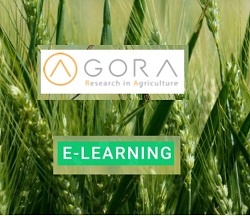Free AGORA e-Course February 2019 Edition. Call for Applications - REGISTER NOW!
08/09/2018


The course (in each language) lasts for two-weeks and requires a six-hour time commitment on average per week.
Interested? Enroll to this course right now! REGISTRATIONS will be open till 27 January 2019 23:00 CET (Central European Time). Selected participants will be notified by email one week before the course starts.
[see details below] |
|
|
BACKGROUND
The Food and Agriculture Organization of the United Nations (FAO) in collaboration with Research4Life will deliver the online course AGORA Fundamentals of Information Literacy and Access to Global Online Research in Agriculture, in February 2019. The course aims to deliver knowledge about the fundamentals of information literacy competencies and develop necessary skills to access and effectively use AGORA.
The AGORA (Access to Global Online Research in Agriculture) programme, set up by the FAO together with major publishers, enables low-income countries to gain free or low cost access to an outstanding digital collection in the fields of agriculture, forestry, fisheries, climate, food security and related sciences. AGORA offers up to 13,700 key journals and 26,900 e-books providing full-texts to more than 3,400 institutions in more than 115 countries. AGORA is one of the five programmes that form Research4Life: AGORA, HINARI, OARE, ARDI and GOALI.
Outline
The course consists of two units and six lessons as follows:
Unit 1: Identify, Access and Use Information Resources
- Lesson 1.1: Identifying information sources
- Lesson 1.2: Using information resources
- Lesson 1.3: Citing and referencing
Unit 2: Access to Global Online Research in Agriculture (AGORA)
-
Lesson 2.1: AGORA and Research4Life: Institutional framework
-
Lesson 2.2: Search AGORA effectively
-
Lesson 2.3: Using Summon (optional)
Learning outcomes
At the end of the course, participants attending the course will be able to:
-
Identify and evaluate information sources, develop search strategy, be familiar with search techniques;
-
Understand ethical considerations in academia, gain skills in citing and referencing;
-
Obtain in depth knowledge on the institutional framework of AGORA and Research4Life programmes, registration process for AGORA and terms of use;
-
Access and search AGORA content effectively including browsing collections, applying advanced search techniques, using discovery service and the bibliometric analytical tool.
Who can apply?
The course is designed specifically to serve the needs of researchers, academics, research officers, librarians, IT specialists, other practitioners and students in agriculture and relevant fields such as forestry, fisheries, climate, food security and related sciences from:
- Research4Life eligible countries (Group A, Group B) and
- Types of eligible institutions including national universities, professional schools, research institutes, government offices, national libraries, agricultural extension centers and local non-governmental organizations.
- - - - - - - - - - - - - - - - - - - - - - - - - - - - - - - - - - - - - - - - - - - - - - - - - - - - - - - - - - - - - - - - - - - - - - - -
- AGORA (facts and details)
- Research4Life TRAINING Materials : Be an advocate for the quality research in agriculture, health, environment, law, development and innovation!
- The total number of AGRIS records reaches 9,257,658 (November 2018). AGRIS (International Information System for the Agricultural Science and Technology) is a free of charge service that provides access and visibility to research information resources in agricultural and related sectors
- Looking for open access publications about agriculture, nutrition, and food security? Check out CGSpaceResearch
-
200 years of Flora: free access to all articles in ELSEVIER
- - - - - - - - - - - - - - - - - - - - - - - - - - - - - - - - - - - - - - - - - - - - - - - - - - - - - - - - - - - - - - - - - - - - - - - -
You are welcome to Sign up for AIMS News, follow @AIMS_Community on Twitter.
And, thanks again for your interest !
